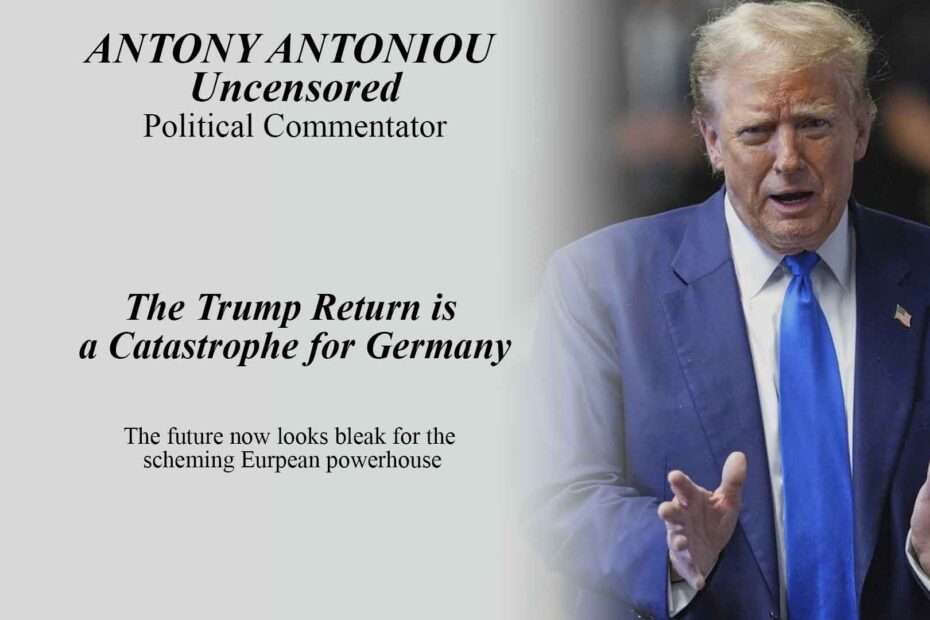The Trump Return is a Catastrophe for Germany
Tariffs and Ukraine’s Capitulation Would Devastate Europe’s Former Economic Engine
The venerable German newspaper Die Zeit captured the moment with a single English word splashed across its front page, summarising the implications for Europe, NATO, the world trading system, and particularly Germany: “F–k”.
“Neither looking away nor fear helps, and ultimately we’re left with feeble self-consolation,” the paper noted, referencing Heinz Kohut’s Self Psychology for a Fractured World.
A Trump return poses challenges for Labour-led Britain too: the Trump inflation trade has driven 10-year gilt yields to nearly 4.6pc, consuming Rachel Reeves’s “headroom” before she begins. Yet Trump may overlook our Foreign Secretary’s previous description of him as a “woman-hating, neo-Nazi-sympathising sociopath”.
David Lammy’s foresight in cultivating Trump’s advisers aligns with his ‘progressive realism’ approach. He’s engaged positively with Project 2025’s architects, whose blueprint for Trump’s second presidency emphasises “urgent development of post-Brexit UK trade before London gravitates back to the EU”.
Whilst the special relationship may face awkward moments, Labour and MAGA might find unexpected common ground.
For Germany, however, Trump’s triumph spells unmitigated disaster, coinciding with the uncharacteristically discordant collapse of Scholz’s coalition.
“Trump’s victory marks the Federal Republic’s most challenging economic period,” warns Moritz Schularick, who leads the Kiel Institute. “Our domestic structural crisis now compounds severe foreign trade and security challenges we’re ill-equipped to handle.”
Recent industrial figures reinforce this pessimism, showing a further 2.5pc September decline, including a 7.8pc drop in automotive production. Industrial output has retreated to levels last seen 18 years ago, whilst the German economy has stagnated since 2018.
Trump’s peculiar animosity towards Germany—despite his grandfather Friedrich Trump’s Rhineland roots—stems from his perception of German opportunism. He accuses the nation of exploiting both American consumers and military protection whilst enjoying preferential Russian energy arrangements.
“My first move was terminating Nord Stream 2,” he recently told Chicago’s Economic Club. “Consider this: Putin constructs the world’s largest pipeline to Germany, receiving billions monthly, yet we’re expected to defend you against your primary energy supplier?”
His aversion to German vehicles (though he owns several) originated from Trump Tower views of Mercedes and BMWs dominating Fifth Avenue.
Whilst his focus on automobile sales may seem outdated—AI firm Nvidia’s £3.6 trillion valuation dwarfs Volkswagen’s modest £4 billion—Trump correctly identifies Germany’s export-driven model as a significant market distortion.
Germany’s current predicament is well-documented. Every strategic gambit has backfired. The Nord Stream pipelines lie damaged beneath the Baltic, whilst Germany’s dangerous bargain with Xi Jinping’s China has backfired as Chinese firms master—or appropriate—German expertise, outperforming the export champion domestically and across Europe.
Six years ago, a prescient Volkswagen executive warned staff that “perpetual success isn’t guaranteed” and that Germany’s automotive sector risked following Coventry’s fate if it remained wedded to combustion engines whilst underestimating electric vehicles. His reform attempts led to his dismissal.
VW now faces three German factory closures. National car production has plummeted from 6m units in 2014 to 4.2m last year. The EU’s Draghi report acknowledges Chinese EV supremacy “across virtually all metrics”, from range to charging speed and software.
This week marked the collapse of Germany’s final wager. The nation confronts twin threats: a Trump presidency potentially enabling Putin’s Ukrainian victory—with profound EU implications—and sweeping tariffs of 10pc to 20pc on European exports, possibly higher for automobiles.
Trump’s Chicago remarks revealed his perspective: “The European Union—such a lovely concept, these charming European nations united. Yet they reject our cars, our agricultural products—everything. You face a £312bn EU deficit. They’re essentially a smaller-scale China.”
Though last year’s actual deficit was £170bn, his argument resonates. Germany generated half this imbalance, highlighting deeper issues. The country has maintained a 6pc to 8pc GDP current account surplus for nearly twenty years (matching Sweden and Holland).
This reflects deliberate policy choices: tax and regulatory frameworks, coupled with fiscal orthodoxy, that suppress domestic consumption and wages to benefit export industries.
Typically, substantial surpluses self-correct through currency adjustments. Germany circumvented this through the euro’s creation. Trump’s advisers long accused Berlin of manipulating monetary union for competitive advantage.
This contains elements of truth, despite lacking intentionality. German cultural attitudes equate thrift with virtue—perhaps attributable to Luther or the German word for debt, “Schuld” (guilt). Nevertheless, this surplus fuelled intra-EMU imbalances triggering the eurozone crisis.
German research institutes now scramble to assess Trump’s tariff impact. One projects £150bn losses over four years—devastating for an already stagnant economy.
The Kiel Institute warns of potentially existential consequences if tariff disputes trigger global trading system collapse and geopolitical fragmentation—particularly threatening for an economy where trade approaches 100pc of GDP.
Trump’s ultimate tariff objectives remain unclear—whether revenue generation and protectionism, or leveraging reciprocal market access: “They tax us, we tax them”. His position often varies mid-statement.
Either outcome requires Germany to abandon its post-war economic model. Without constitutional debt brake reform and domestic demand stimulation, Germany risks economic depression and decline. The final consequences of past choices now loom.

